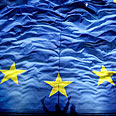
Nobel Prize? For what?
Op-ed: Let's hope EU won't fail as badly as past laureates Obama, Peres and Annan and ElBaradei have
Jut a short reminder: In 1988 the Nobel Peace Prize was awarded to the United Nations Peacekeeping Forces. Since then the inefficiency of these forces has been proven countless times. In 2001 the prize was awarded jointly to United Nations and its secretary general at the time, Kofi Annan, who knew of the genocide plans in Rwanda and did nothing. In 2005 is what the UN's International Atomic Energy Agency that won the prize. The prize was accepted by the head of the agency at the time, Mohamed ElBaradei, who had worked consistently to conceal vital information on Iran's military nuclear program. In 2009 Barack Obama received the award - for reasons that remain unclear to this day – less than a year after he took office. This year's prize was awarded to the European Union for contributing "to the advancement of peace and reconciliation, democracy and human rights in Europe."
The advancement of peace? The victory of capitalism over communism at the end of the 80s allowed for the EU's speedy expansion eastward, but it introduced a new kind of imperialism. The borders were opened up and limited economic prosperity was achieved, but the current financial crisis proves just how unstable a peace that is based solely on money is.
The advancement of reconciliation? The current crisis is indicative of just how thin and fragile this artificially-created European reconciliation is. Nationalism is thriving all across the EU, to such an extent that even old and repressed rivalries are resurfacing. Catalonia is demanding independence from Spain; Scotland from Britain; the Flemish people want to separate themselves from the Walloons in Belgium. Europe does not seem to have reconciled with itself. If anything, the opposite is true.
The advancement of democracy? The creation of the EU was made possible only due the efforts of a political and bureaucratic elite, which at times reached decisions that went against the wishes of the general public in the various EU states. The EU is still not based on the idea of a people's democracy, but rather on the centralism of a corrupt and costly institution. The elections for the European Parliament are consistently marked by a very low voter turnout, while opposition to the union is steadily growing.
The advancement of human rights? Ask the gypsies who have been persecuted in Hungary, France, Slovakia and other countries what they think of it. The EU is worthy of the peace prize just as much as Annan, ElBaradei and Obama were. We can only hope that the EU will not fail as badly as they have, or as badly as those who received the Nobel Peace Prize for the Olso Accords have.










